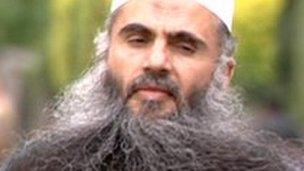David Cameron and King Abdullah discuss Abu Qatada case
- Published

Abu Qatada has fought a long battle against his removal from UK
David Cameron and King Abdullah of Jordan have agreed to work on finding a "solution" to the Abu Qatada case.
The two spoke on the phone on Thursday afternoon. No 10 said the UK prime minister had explained the "frustration" that the European Court of Human Rights ruling had caused.
"They agreed on the importance of finding an effective solution to this case, in the interests of both Britain and Jordan," the spokesman said.
They also discussed Middle East peace.
The European Court of Human Rights has blocked Abu Qatada's deportation on the grounds that Jordan might use evidence obtained by torture against him - even though the UK and Jordan had previously reached agreement that he would not be tortured if he was deported.
The cleric faces terror charges in Jordan and the UK government says he is a threat to national security but a British judge decided earlier this week that his six-year detention could no longer be sustained after the ECHR's ruling.
A Downing Street spokesman said the two "discussed the ECHR ruling on Abu Qatada and the PM explained the frustrating and difficult position that the ruling had created for the UK".
"The PM complimented the king on the close and effective collaboration between Britain and Jordan on this case over a number of years.
"They both welcomed close and detailed co-operation since the ruling between the Jordanian government, and the UK Home Office and the Foreign Office.
"They agreed on the importance of finding an effective solution to this case, in the interests of both Britain and Jordan."
The prime minister's official spokesman said the PM also "congratulated the King of Jordan for his strong leadership on the Amman talks between the Israelis and Palestinians and discussed how to build on the initial steps to move to substantive, direct negotiations as the only way to a lasting peace".
- Published7 February 2012
- Published6 February 2012